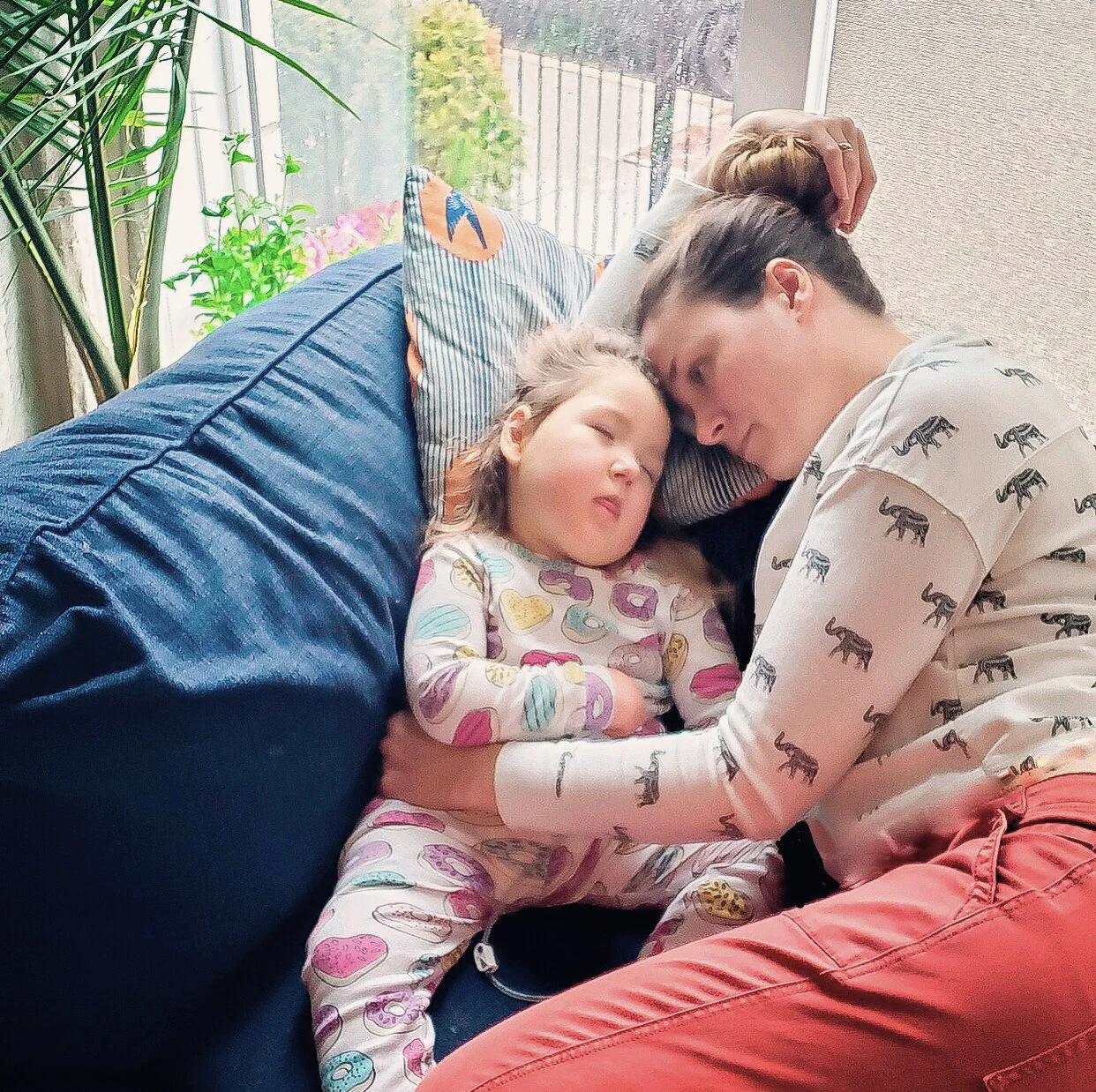Emotional hangover
His cuddles could cure just about any kind of hangover…
Ingredients
Grief resulting from a significant loss
Worldwide pandemic
2 days of basic socialization where grief and pandemic are discussed
At least an hours worth of tears
Pour ingredients into a container that is slightly too small to contain them all
Shake well
Let sit overnight in an overactive brain
Optional garnish: prior night’s used tissues
Best served with anti-depressants and cuddles in bed
Shortly after arriving in New Jersey I discovered just how significantly my social bandwidth had been compromised. I mean I knew it wasn’t strong but it also hadn’t been tested. Our last few months in Chicago had been spent in quarantine with very little in-person contact. The dear friends we did see had been by our side throughout Adelaide’s journey and because of this, our conversations were able to revolve around common denominators: summer plans, losing our COVID-19lbs, and the upcoming school year.
Back in New Jersey and excited to reconnect with our friends here, we made the early miscalculation to schedule a couple back-to-back socially-distant backyard visits. In the midst of these visits I was happy to see friends, catch up and give air hugs. Adelaide was aways discussed which was hard but also necessary. I’ve tip-toed around some of these interactions wondering if it would be easier just to skip this part of the reunion but it doesn’t feel right not to acknowledge Adelaide, a loss that permeates every cell in my body. So we talked about Adelaide, grieved her together and then were able to move on to less emotionally draining topics, you know, like virtual learning… ha! I then proceeded to spend the entire next day in bed with what I can best describe as an emotional hangover: tightness in my chest, heavy heart, foggy head, zero motivation to do anything, and using my comforter as a shield against the outside world.
I learned my tolerance for these interactions was about one every three days or so. Otherwise, I would land myself back in my comforter cocoon. My mental-therapist mother congratulated me on recognizing and establishing my limits. Go me! <read with side eye> I did pretty well for awhile but, sometimes, life demands more of you. As it did this week in advance of the school year. With Jackson entering a new school, in a new district, and needing new friends in his grade, I took a hesitant step over my self-imposed limit and crossed the street to, <gasp>, meet new people.
We could not be luckier to have multiple kids around Jackson’s age living on our street, and under non-pandemic circumstances, I would have sent him knocking on neighbors’ doors to meet them all. But that’s not exactly appropriate pandemic protocol. Instead, I sacrificed Miguel, sending him out to make brief introductions and get phone numbers, but then it was still up to me to follow up. Just as I set aside any medically-related discomforts to care for Adelaide, I pushed my social-emotional discomforts to care for Jackson.
The good news is I survived and we all now have new friends! The bad news is after two days of meeting new families, capped by an outdoor visit with old friends, I was utterly useless as I nursed another emotional hangover. At least with an alcohol hangover you can drink some gatorade, take some Advil, maybe a nap, and push through. Emotional hangovers just take time, naps, cuddles from loved ones and benzos may help, but in my experience there is no quick fix.
One of my new neighbor friends sent me an article posted on medium.com by Marissa Evans, called, “Chronic Stress Is an Underestimated Pandemic Risk Factor”. In the article, Marissa writes about our surge capacity to manage stress. That in typical life we have adrenaline to help push us through stressful moments, days or weeks. But with this pandemic our surge capacity has been forced to extend for months and we’re just not built to handle this level of stress for such an extended period of time. Makes perfect sense, right?
“But then how was I able to handle the chronic stress of caring for Adelaide for YEARS?” I asked myself feeling shame for a sudden apparent show of weakness.
Until I remembered the daily naps I would take, often just 30 minutes, but enough to mentally recharge. Also, the weekly cry-fests when I would get overwhelmed by the complexity of Adelaide’s care. Special needs caregivers blew out their surge protectors a long time ago, which perhaps is why many of us were able to adapt to early COVID stress a little better than others. But we all have our walls and the actions that accelerate us toward them. It wasn’t weakness when Adelaide was alive and it isn’t now, it’s just that my emotional cocktail of choice has changed from a salt-rimmed ‘Desperate Caregiver’ to an extra-sour ‘Unimaginable Griever’. One cocktail on its own isn’t going to give you a hangover but line them up in quick succession and you’re going to be hurting in the morning. So, nurse that hangover and re-evaluate your drink limit.. Then take your meds, text a friend and find someone cute to cuddle.




